
Renee French
* Location: Silicon Valley, California and Sydney, Australia
* How would you describe your art?: I have trouble doing that. I suppose everybody has trouble describing their own work though.
* Currently working on: Artwork for an exhibition in NYC at the Adam Baumgold Gallery that's related to my book THE TICKING. And a new book project.
* 3 Likes: Fruit Bats, Diet Vanilla Coke, Formula One Racing
* 3 Dislikes: Coriander, the word Moist, people talking about politics over dinner
* Daily Inspirations: Dog faces, Bourgery's Atlas of Anatomy, and looking out at the Bay in Sydney
* Favourite album(s) to listen to when working: I don't listen to music when I'm working. Lately I listen to Ricky Gervais & Steve Merchant's old XFM shows, and their podcasts over and over again while I work.
http://www.reneefrench.com/
http://www.reneefrench.com/
- - -
This interview took place in mid-July 2006. All images reproduced with permission from Renee French ©
- - -
Hi Renee, how are you? What are you up to at the moment?
I'm fine, thanks. Mostly in the early writing stage of a new book that I'm not really talking about, and making drawings for an upcoming show in New York.
What materials do you work with to achieve your artwork? Do you have preferred techniques?
The materials are coloured pencils and paper. In my comics work I mostly use black or sepia coloured pencils and my children's books are made with watercolours and coloured pencils. The paper is just a canson cold press drawing paper.
Personally, what are the most compelling and interesting things for you to draw, or stories for you to depict & share?
I love details. Stories about kids, and science and details. Small, isolated worlds interest me in both reading and writing/drawing.
I once read you claim that 'I'm actually always working'. Is it a juggling act trying to keep on top of all your creative commitments?
Yeah, I suppose it's a sickness, the always working thing. I find it almost impossible to let go and stop working for even a few days. Work is how I relax and when I'm not drawing or writing, I'm working stuff through in my head. Right now I'm trying not to commit to more than one big project at a time, though last year I was finishing up two major book projects at the same time. I wouldn't recommend that to anyone like me; someone who can switch back and forth could handle it better, I’m sure.
How do you curb burnout, especially since, as I read, you work from home?
When burnout happens on a project I go to a different one, or create a different one. I've never burned out completely on making art. Working at home means I do end up working until right before I go to bed. What that means is that I don't sleep well.
I once read you claim that 'I'm actually always working'. Is it a juggling act trying to keep on top of all your creative commitments?
Yeah, I suppose it's a sickness, the always working thing. I find it almost impossible to let go and stop working for even a few days. Work is how I relax and when I'm not drawing or writing, I'm working stuff through in my head. Right now I'm trying not to commit to more than one big project at a time, though last year I was finishing up two major book projects at the same time. I wouldn't recommend that to anyone like me; someone who can switch back and forth could handle it better, I’m sure.
How do you curb burnout, especially since, as I read, you work from home?
When burnout happens on a project I go to a different one, or create a different one. I've never burned out completely on making art. Working at home means I do end up working until right before I go to bed. What that means is that I don't sleep well.
In previous interviews, speaking of your artistic processes you have often used qualifiers such as 'I'm really too neurotic about it. Everything has to be really tight in my drawings' or that, 'I don't feel comfortable writing because I'm not good and there are lots of people around me who are. I have an inferiority complex' and that, 'why would anybody care about [this personal] stuff.' I also read you claim that you abandon about 4 out of 5 of your ideas.
I'm hugely interested in where women find access to their confidence in order to be creative. It has, at times felt like you have struggled with the barriers to self-belief. What strategies do you use to overcome a lack of confidence, or too many neuroses, in order to be able to be creative and be able in turn to put your work 'out there'?
Wow, what a question. I don't think the lack of confidence is related to my sex, first off. I know plenty of guys who are the same way, and actually, when it comes down to it, I don't end up holding things back because of lack of confidence but because those 4 out of 5 ideas suck. Strategies to over come a lack of confidence or too many neuroses...I just don't think about it in the end. I just make it as close to what I want it to be and then send it out there.
I once read of Karen Finley's performance art that she wanted to make work that people could understand, that would have references to the world rather than to the history of art. This statement is something that I find myself thinking about when viewing your work as it is so relatable (despite often surreal!) in its references to the world, and often provides important, personable commentary. When we first spoke, you claimed that you were pleased that I enjoyed your graphic novel, The Ticking as it was so personal for you that you 'thought nobody would get anything from it at all'; but is precisely the personal, intimate messages and emotion that your work often portrays that sucks me in and makes me appreciate your art so much.
Is it important to you to make work that makes references to the world that can be appreciated (whether to you personally, or to your audience)?
I love it when someone relates to my work, but it's more important to me that I make something that's true to myself. I guess one leads to the other. With The Ticking, after it was finished I started to think about the audience. That's when I got nervous that nobody would relate to it. My favourite part of making stories with pictures and words, is the laying out, the writing down, making notes, and especially the drawing.
Some of your work could be read as being surreal, 'weird', or oblique; or, as one reviewer put it, 'a skewed approach to conventional storytelling'. Linked to this, speaking of David Lynch and your appreciation & the inspiration you've gained from him over your own work and the freedoms in your work, you said, 'he showed that you can portray what you're feeling in work and it's okay, even if nobody is going to get it'. I've recently been reading a collection of Sarah Kane's plays and I've been enthralled. But the thing is, I don't know what they're always about, or even what they're always getting at (or, actually, maybe I do and my subconscious is blocking out that understanding!!), but being thrown in at the deep end and having to fight my way to an understanding and appreciation is enthralling to me. It almost feels like I've had to work at 'getting' the work, and as such I've engaged with it so very closely – but similarly, even the stuff I haven't fully 'understood' is still enthralling. In terms of 'understanding', what role does audience understanding and interpretation hold for you? – are you conscious of how your art and its intentions will be received and 'read' as you're producing it, especially since people do get so close and emotionally attached to your work?
I'm aware that I'm telling a story, and if it's going to work as a story the audience has to "get it" at least a little bit. But, truly, in the writing stage I don't think that much about anyone else but me understanding the story. I'd rather the story not be over-explained. Sometimes there's a danger that the reader won't understand what's happening in the story, but if there are enough cues there, then maybe it's just a challenging read, and that's always more fun than an obvious, over-told story. To me anyway.
I once read you state that, 'when you're making the thing, you know what you're trying to say. It's hard to know what the reader will get. I think in a lot of my earlier stuff I was over-telling and not trusting the audience to get something. Or maybe I was trusting the reader too much and nobody knows what the hell it's about at all.' For you, how fine is that line between over-telling and being oblique (and which of these is more interesting to draw?), and how important is the element of trust between an artist and her audience?
The line between over-telling and being oblique isn't that fine, but I think it's difficult to see when you're working on a story. Spending so much time with a story means you very quickly lose the ability to see it clearly, as it would be read by a first time reader. I think filmmakers have this problem and when they go over the top and explain too much it feels wrong. Seems like the filmmaker should have been able to see that the audience will understand what's going on without adding a bunch of dialogue explaining it. I think it seems like a fine line, but it's actually just a difficult thing to get right. Trust between artist and audience is important. If a reader can't trust the artist to know exactly what she/he's doing, then story elements that seem odd might be interpreted as a mistake and throw the reader out of the story. Audiences need to trust the artist. Also, I think the artist needs to trust the audience to be smart. All this trust from the artist though, in my case, comes in the editing process; after the thing is pretty much done. Then decisions to add more detail to explain, or not to add those details comes into it. I’d rather not add anything that's not absolutely needed. In fact I like to take things out.
I recently read an interview with Julie Doucet where when asked if she felt her work had ever been misinterpreted she replied, 'No, no. but I didn't really mean anything special by it. When the work comes out, it's not my business anymore. Everybody should have their own interpretation, their own experience with it.' Whilst I am a firm believer in the importance of viewers being allowed to interpret art - and the importance in crediting the feelings, perspectives and experiences of viewers, and thus challenging the hierarchy between artist and audience (a hierarchy which is often positioned within 'high' art) - how disheartening is it to maybe feel misunderstood, or criticised due to how your work has been interpreted, confused or appropriated by an audience, and thus perhaps skewing your original ideas?
Today I was sent a review of The Ticking and it was surprising how 'off' the interpretation was from what I intended. I learned some things about the reviewer from reading his review. It was interesting. There was one time I was disturbed by a misinterpretation of my work though; A story I did for Strapazin (I think that's where it first appeared) called Steelhead, which was about the same character that stars in The Ticking was shown in a gallery show and written about in the catalogue. The critic wrote that the story was about Steelhead and a young boy, suggesting there was something sexual going on. But, the character she thought was meant to be a little boy was actually meant to be a woman. She was drawn to look like a strange rodent like creature but she was clearly wearing a skirt and boots. The critic had decided I was making a comment on homosexuality or something. That did bother me a bit, just because it was so far off, and the details that made the character a girl were so obvious.
Thinking about viewers' connections to your work, I once read a reviewer state of your work that 'I felt myself drawn into an emotional territory I hadn't realised was there. The compelling realisation that, past the edge of whatever I don't want to think about, there's more.' Is it important to you to make people think about and address that which is often swept under the carpet or that which goes unmentioned (whether due to shame, fear, embarrassment, politeness, misunderstanding or whatever)?
It's not about wanting to make people think about anything really. It's more selfish than that. It's about drawing out the things that scare ME, that unsettle ME. When that reviewer had that emotional response, she was responding to something that first made me respond that way.
The line between over-telling and being oblique isn't that fine, but I think it's difficult to see when you're working on a story. Spending so much time with a story means you very quickly lose the ability to see it clearly, as it would be read by a first time reader. I think filmmakers have this problem and when they go over the top and explain too much it feels wrong. Seems like the filmmaker should have been able to see that the audience will understand what's going on without adding a bunch of dialogue explaining it. I think it seems like a fine line, but it's actually just a difficult thing to get right. Trust between artist and audience is important. If a reader can't trust the artist to know exactly what she/he's doing, then story elements that seem odd might be interpreted as a mistake and throw the reader out of the story. Audiences need to trust the artist. Also, I think the artist needs to trust the audience to be smart. All this trust from the artist though, in my case, comes in the editing process; after the thing is pretty much done. Then decisions to add more detail to explain, or not to add those details comes into it. I’d rather not add anything that's not absolutely needed. In fact I like to take things out.
I recently read an interview with Julie Doucet where when asked if she felt her work had ever been misinterpreted she replied, 'No, no. but I didn't really mean anything special by it. When the work comes out, it's not my business anymore. Everybody should have their own interpretation, their own experience with it.' Whilst I am a firm believer in the importance of viewers being allowed to interpret art - and the importance in crediting the feelings, perspectives and experiences of viewers, and thus challenging the hierarchy between artist and audience (a hierarchy which is often positioned within 'high' art) - how disheartening is it to maybe feel misunderstood, or criticised due to how your work has been interpreted, confused or appropriated by an audience, and thus perhaps skewing your original ideas?
Today I was sent a review of The Ticking and it was surprising how 'off' the interpretation was from what I intended. I learned some things about the reviewer from reading his review. It was interesting. There was one time I was disturbed by a misinterpretation of my work though; A story I did for Strapazin (I think that's where it first appeared) called Steelhead, which was about the same character that stars in The Ticking was shown in a gallery show and written about in the catalogue. The critic wrote that the story was about Steelhead and a young boy, suggesting there was something sexual going on. But, the character she thought was meant to be a little boy was actually meant to be a woman. She was drawn to look like a strange rodent like creature but she was clearly wearing a skirt and boots. The critic had decided I was making a comment on homosexuality or something. That did bother me a bit, just because it was so far off, and the details that made the character a girl were so obvious.
Thinking about viewers' connections to your work, I once read a reviewer state of your work that 'I felt myself drawn into an emotional territory I hadn't realised was there. The compelling realisation that, past the edge of whatever I don't want to think about, there's more.' Is it important to you to make people think about and address that which is often swept under the carpet or that which goes unmentioned (whether due to shame, fear, embarrassment, politeness, misunderstanding or whatever)?
It's not about wanting to make people think about anything really. It's more selfish than that. It's about drawing out the things that scare ME, that unsettle ME. When that reviewer had that emotional response, she was responding to something that first made me respond that way.
Kinda linked; there have been themes (morals?) in some of your work, such as The Soap Lady and The Ticking of 'not judging a book by its cover', or looking beyond face value, or surface appearance, amongst other things. Is it a conscious aim of yours to portray, promote and broaden the constructs of acceptance, within your work?
Well I just think that's where I end up. I'm interested in what beauty is, and why it's so important. Why are the good characters in Disney stories always beautiful, and the bad characters ugly?
From a creators point of view, how important is the emotion in your art? A review of The Ticking in Punk Planet stated, 'French packs more heart-rending emotion and anxiety into a single comic panel than most cartoonists can pack into an entire page.' How close do you think elements of emotion and anxiety run into each other in your work?
I find they run into each other all the time in life, but I'm kind of surprised that people see that much emotion in my panels. Sounds stupid but I do try to feel the emotion I'm drawing, and then when the drawing is finished I can't see that emotion in the marks on the paper, but others sometimes do. It’s nice when that happens.
As well as many of your comics being 'all ages' material, you have also specifically worked on children's books. How important do you think the role of art is in children's lives, and to what extent do you feel it plays an important part in children's development? – is it important to you that you provide such art to children?
I don't have kids, and don't spend much time around them, so I can't really talk about how important it is in children's development. I can say that it was extremely important to me as a child. I memorized drawings in my picture books when I was little and still remember every line in a lot of those drawings. I also looked at a lot of reproductions of paintings in the art books we had.
Can you imagine doing what you do today had you been deprived of art and creativity as a child?
No.
I once read a really interesting interview you gave to Tom Spurgeon, where you were both discussing authenticity and the fear or danger of being a 'copier' of others' original work, techniques, or ideas however unintentionally. I was recently re-reading an essay by the theorist Roland Barthes where he claims that text [or in our case, art] is a 'multi-dimensional space in which a variety of writings, none of them original, blend and clash. The text is a tissue of quotations drawn from the innumerable centres of culture … the writer can only imitate a gesture that is always anterior, never original.' Whilst this is a rather waffley, pompous statement, I guess to a certain degree his claims of originality are true; and as such it is perhaps a very important reminder not to stifle or restrict ourselves just because we may think that something has been 'done' already – because, in Barthes' words very little is original anyway. What are your thoughts on this?
Yeah, my not wanting to "copy" someone's ideas is really a problem I have that I admit is irrational in a lot of ways. The example I used in that Spurgeon interview (I think) was the one about Ted Stearn and me coming up with the same idea at the same time and since he got his book out first, and I was still working on mine, when I saw his use of the idea (a floating carnival), I took it out of my book. I just didn't feel good about using it in my story when he'd used it in his already, and so well. Ted told me there was no reason for me to take it out of my book, but I just couldn't leave it in. In that case, there was no copying. We had been working on our stories at the same time and hadn't seen each other's stories, so it was just a case of two people thinking of the same thing at the same time. Who knows, I probably stole it from something I saw when I was 5 years old. It's just a personality flaw.
Do you get much feedback about your work from people reading/viewing your work? - are you aware if other women have been encouraged and inspired, directly or indirectly to embrace their creativity and artistry as a response to reading your comics?
My audience seems to be mostly guys, but I do have women readers, and most of the feedback I get is positive. I love getting mail from people who have a response to my work. I have gotten a couple letters from young women artists who've been encouraged by the fact that a female artist has done work that isn't afraid to be disturbing. I'm not sure why women feel they can't be disturbing, or, why men sometimes seem surprised that Renee French is a woman. I can't count the number of letters I've gotten from men who believed that my books were written and drawn by a man named Renee French. I have to say that I don't mind that at all because I'd rather my work be seen for what it is, and not for being the work of a "female cartoonist."
What do you enjoy most about the creative process of drawing?
The drawing. I love drawing. I love the way the pencil feels when it's dragged across the paper. I love seeing the shadows and the highlights defining the shapes. I love seeing the characters looking back at me. It's all good.
And, finally, just *how* adorable is Patrice [the monkey] in The Ticking!?!
HAH!!! True. I did fall in love with Patrice. Truly. I've made a few giclee prints that are blow ups of the young Patrice looking straight out at the viewer in her little dress. I've given them as gifts but I'm thinking of having more made.
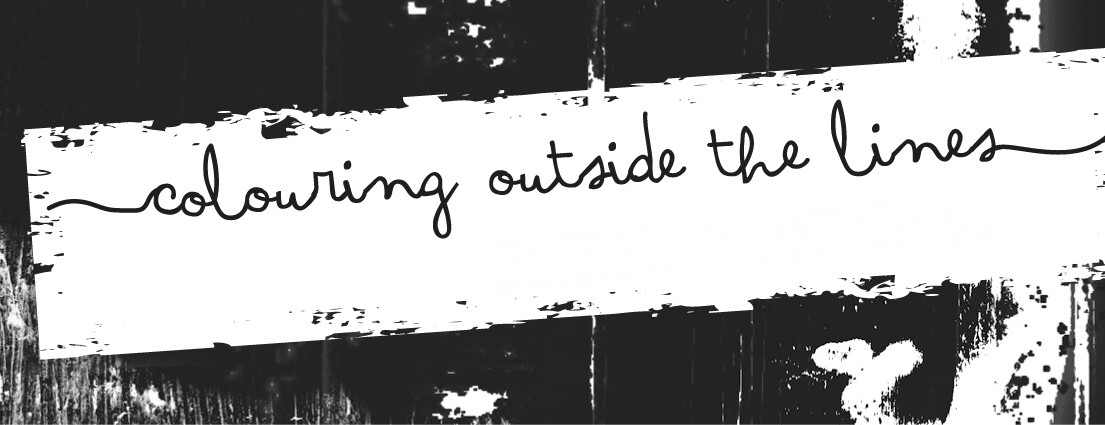





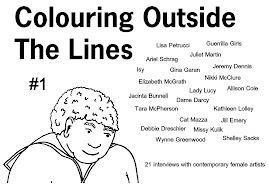
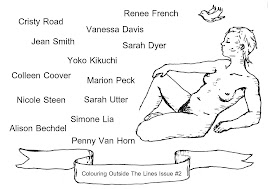

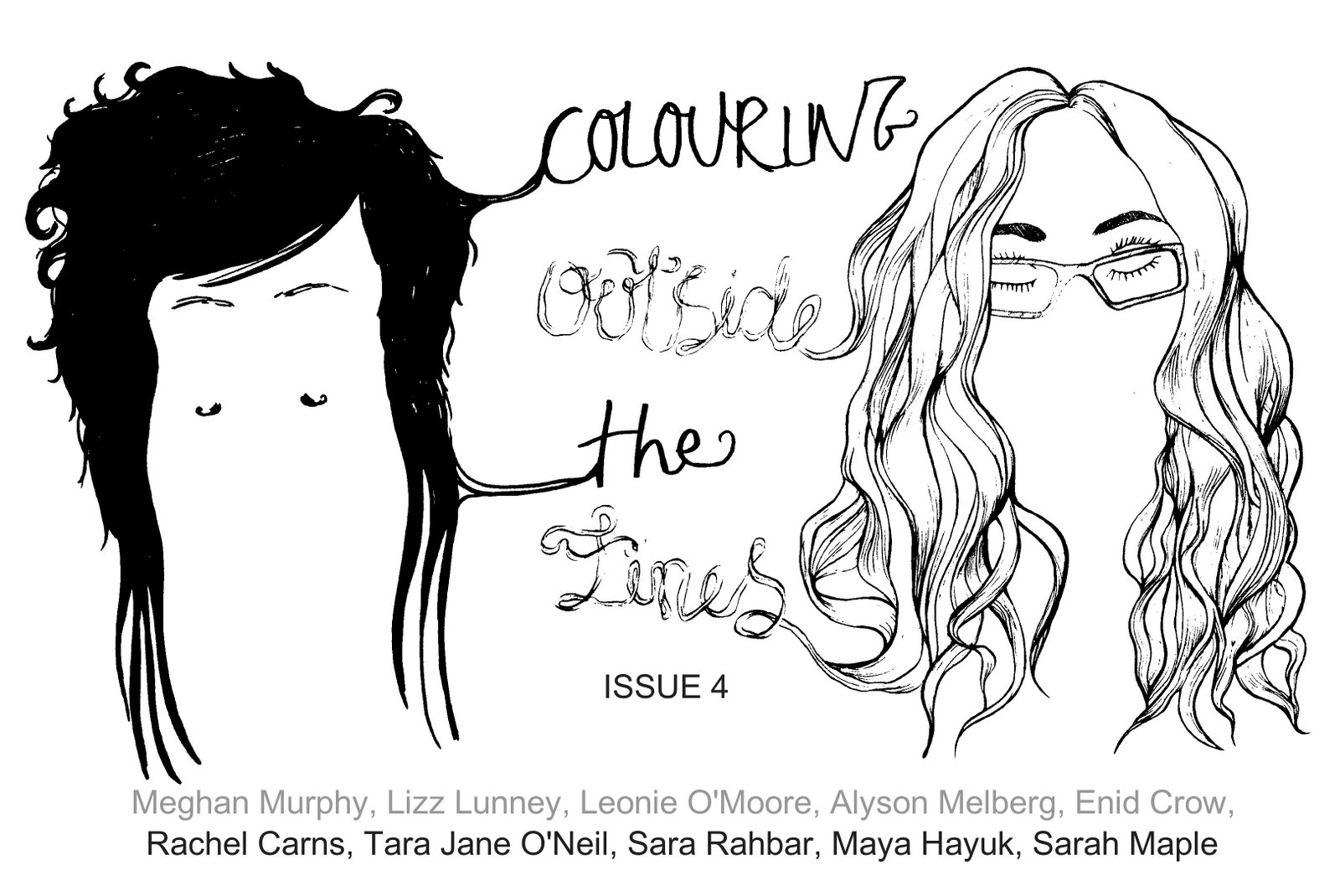

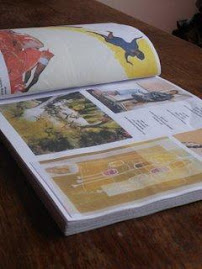



No comments:
Post a Comment